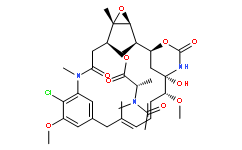| References: |
Maytansine, a benzoansamacrolide, is a highly potent microtubule-targeted compound that induces mitotic arrest and kills tumor cells at subnanomolar concentrations. However, it failed as an anticancer agent in human clinical trials because of lack of tumor specificity and unacceptable systemic toxicity. The potent cell killing ability of maytansine can be used in a targeted delivery approach, such as an antibody-drug conjugate, for the selective delivery of the drug and destruction of cancer cells.
The ansamycin antibiotic was originally isolated from the Ethiopian shrub Maytenus serrata and binds to tubulin at the rhizoxin binding site. It inhibits microtubule assembly, induces microtubule disassembly, and disrupts mitosis. Maytansine exhibits cytotoxicity against many tumor cell lines and may inhibit tumor growth in vivo.
Maytansine and its analogs (maytansinoids DM1 and DM4) are potent microtubule-targeted compounds that inhibit proliferation of cells at mitosis. The antibody-maytansinoid conjugates consist of maytansinoids attached to tumor-specific antibodies. |























